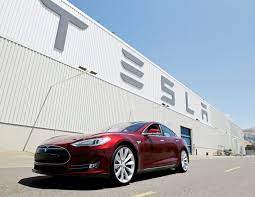The electric vehicle manufacturer Tesla, which hopes to see widespread adoption of its vehicles, is set to construct a 25,000-euro ($26,838) automobile at its facility close to Berlin, a source with knowledge of the situation said on Monday.
No timeframe was given for when production would start.
When pre-market trading began in the US at 09:10 GMT, its shares were up 3%.
Consumer polls reveal that high borrowing rates and the expensive cost of electric cars are just two of the many barriers preventing the technology from becoming more widely adopted in Europe and the US.
In the first half of 2023, the average retail price of an electric vehicle (EV) in Europe was over 65,000 euros, whereas in China, it was a little over 31,000 euros, as per the auto research firm JATO Dynamics.
After declaring in 2022 that he had not yet perfected the technology, Musk abandoned his long-term plans to produce an electric automobile at a lower cost.
Nonetheless, in September, sources said that the automaker was getting close to a breakthrough that would enable it to die-cast almost the entire EV’s underbody in a single piece, which would speed up manufacturing and cut costs.
To differentiate itself from competitors like Volkswagen, which has resorted to protecting profit margins in the shift to electric vehicles rather than setting delivery targets, Tesla must expand into the mass market in order to achieve its goal of increasing vehicle deliveries to 20 million by 2030.
A WAGE INCREASE
In a video posted on Elon Musk’s social media platform X on Friday, the company’s chief executive commended the workers for their hard work during a visit to the Gruenheide facility.
He told employees at that same meeting that the 25,000-euro car would be built there, the individual claimed.
Currently, the Model Y, the best-selling EV in Europe, is produced at the German facility.
The automaker announced in March that it was producing 5,000 cars a week, or about 250,000 a year, but it hasn’t disclosed how many cars it actually makes at the German plant, which it intends to double to 1 million vehicles annually.
Without giving a date, local officials stated in October that they had requested additional information from the automaker regarding how its expansion plans would comply with laws protecting the environment before deciding whether or not to accept them.
Additionally, Tesla told employees on Friday that starting in November, all employees would receive a 4% wage increase. Additionally, starting in February 2024, production workers would receive an additional 2,500 euros annually, or an 18% pay increase in one and a half years.
In 2022, the German organization IG Metall said that Tesla’s wages were about 20% less than what other automakers’ collective bargaining agreements promised.

















